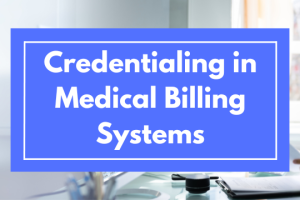Schedule A Demo Now
What is an EHR?
If you have been in healthcare for any amount of time, or even visited a doctor, it is likely that you have used an EHR or had your data stored in one. Electronic health record (EHR) systems are digital systems that are designed to facilitate physician documentation and hold all of the patient’s Electronic Health Information (EHI). Unlike paper records, an EHR is harder to lose or fraudulently alter. They offer backups of information so that if there is a problem, the information isn’t lost forever. Many EHRs today are on the cloud to further mitigate this risk. They allow patients to keep their records digitally rather than having to print them out and lug around a heavy binder full of sensitive medical information. Several different companies offer EHR solutions today, but they are not all created equally.
If you’re looking to transition to a new EHR and practice management system, there is a lot to learn. Together these systems can handle all aspects of patient care and practice management, including but not limited to:
- Automated scheduling
- Monitoring patient progress
- Documentation
- Creating care plans
- Managing clinic tasks
- Processing payments and claims
- Generating supporting documents
- Providing access to digital charts
- Reporting
- And so much more
Some EHR software systems include practice management functionalities and billing capabilities. Others do not. While the systems that only facilitate documentation and housing patient records may be appealing when the price is presented. A provider must ask themselves how much will they have to pay for another software system or internal team member to handle their practice management and billing. In many cases, having separate software platforms can complicate things greatly and usually cost more than consolidating vendors. Integrations can be tricky and some are impossible when using multiple vendors. Having multiple systems increases the chance for something to go wrong, ultimately contributing to downtime of the system giving the practice manager another headache. Having multiple systems increases the number of systems you and your staff must be trained in and increases the number of vendor relationships you have to manage.
What questions should I be asking when considering EHRs?
Choosing the right EHR is a unique decision that each practice or provider will have to consider for their specific needs. However, there are some general guidelines and questions that you will want to keep in mind when you’re making this change. To begin, you’ll want to define the goals of your practice and then use that information to tailor a workflow to your organization based on those goals.
You will also need to discuss the technical requirements and any potential barriers that may come up (more on those later). You should analyze the platform, discuss your needs with the provider, and ask questions like:
- Can this system streamline my practice management?
- What is the downtime of this platform or software system?
- How will my data be migrated?
- Who is available when I need support?
- What does training cost?
- What features does this EHR offer?
- Can I bill through this system?
- How does the integration work?
- Can I customize the EHR to suit my practice needs?
- What are the ongoing maintenance needs and related costs?
- Does this system require me to purchase data servers?
- What does data security look like?
- Is this system ONC Certified?
- Does this system have a patient portal?
These are basic questions that will ensure that you’re on the right track with choosing an EHR, no matter what type of practice you operate or how many patients you have.
The Challenges of Selecting an EHR System
Selecting the right EHR brings with it its own set of challenges. How can practices know what to look for in an EHR if they are new to the technology? What types of features should be prioritized for certain types of practices or medical offices, as compared to others?
This greatly depends on your speciality and practice size. Attend demos with several companies before making such an important decision. EHR companies want clients that are a good fit because it is a closely held relationship they want to keep. Implementation takes time and energy from the practice as well as the EHR provider. Good sales people want to make sure it is a good fit. Tell the sales people exactly how you plan to use the system and what your workflow looks like as a clinician. They will be able to guide you through the features that are most applicable to your situation so you can make the best decision for your business.
Another question to ask yourself before embarking on a new EHR journey is- How far are you hoping to grow? Practice owners and providers will want to ensure that they choose EHR systems that grow with them so that they don’t need to change systems as time goes on. Fortunately, most of today’s solutions offer a lot more continuity and ongoing support so that providers don’t have to change platforms or re-evaluate everything just because they need more assistance.
Changing EHRs and the Difficulty of Adoption
If you’ve got an existing EHR and you are transitioning to a new one, that brings with it a host of different challenges. You will have to learn the new system and its inner workings. Practice managers and physicians that are going to make the most of a new EHR must be open-minded and ready for the change. The people that you treat and the employees that work for you all follow your lead. If you’re panicked and worried about the change to a new EHR, they will be, too.
Adoption takes time and effort, but it’s something that can be done with the right resources in place.
There may also be some external barriers to adopting your EHR, including things like technical support, technical resources, and ongoing maintenance costs. Some companies charge additional fees to provide training on their products. Most EHRs are on the cloud today and do not require practices to house their own servers, but some do. If you are required to keep a server, you must think about security, server maintenance, and updates. Make sure to know which model a particular vendor uses before making the decision. You should evaluate these and see what your practice can do to alleviate these concerns and address them accordingly.
The final challenge to adopting a new EHR that will deliver the solutions that your practice needs is making sure that the staff is all on board. People balk at change, naturally. However, with a steady, assured leader, they will start to change their mind and see that this can be a good thing and even make their lives easier in the long run.
How Can ClinicMind Help?
At ClinicMind, our cloud-based EHR, practice management system, patient portal, and billing softwares are designed to be scaled and customized to the needs of your practice specifically. Our comprehensive platform comes with the assistance of dedicated ClinicMind staff who can assist with everything from walkthroughs and simple FAQs to in-depth information offered by various subject matter experts (SMEs) that can deliver all the support that you need when transitioning to a new EHR.
Many competitors charge extra for one-on-one training and personalized support. When you partner with ClinicMind, you get all this included, along with a streamlined system that makes your practice more efficient. This reduces your costs related to the upgrade and positions your clinic to become among the most streamlined out there with the help of our cloud-based platform. We have physicians, financial experts, and other SMEs to help you understand what’s happening and how to make it work best for you.
Conclusion
The entire goal of EHR and practice management systems is to streamline the day-to-day operations of the practice, as well as to standardize and streamline patient recordkeeping and information sharing through a cloud-based network. That can seem like an insurmountable task for those who are just getting to know the world of digital EHR systems, but it’s quite simple when you plan accordingly and choose the right solutions.
A partnership with ClinicMind to develop your own custom EHR solution will give you the opportunity to improve your practice recordkeeping, streamline information sharing, and improve your efficiency by taking advantage of automation and AI. And remember, there will be challenges along the way, but they can all be overcome with the right platforms and partnerships.










